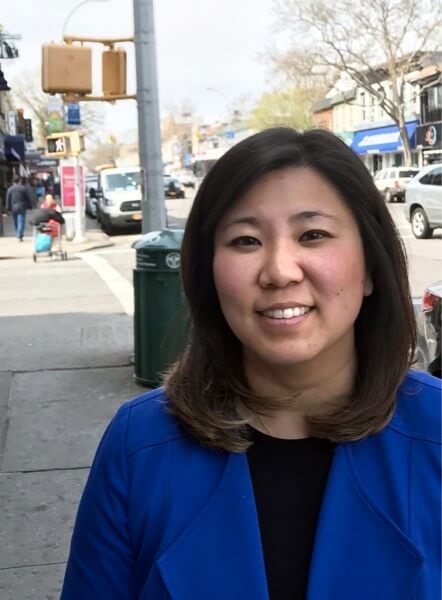By Mark Hallum
U.S. Rep. Grace Meng (D-Flushing) finds serving during the Donald Trump era in stark contrast to the environment she became used to when Barack Obama was in office.
Meng, who was just elected to her third term in office, visited the TimesLedger newsroom last week, offering candid insights on the Beltway amid the unpredictable new president.
But in her eyes, the left and right wing of Congress is not as divided in their thinking as one might imagine.
“I think President Trump is someone who obviously the Democrats don’t see as their president,” Meng said, “but I think in many cases, the Republican Congress members don’t necessarily see him as their president either. For most of them, it’s not some who they’ve worked with throughout their political careers, and now they are learning just as much as we are about how to deal with him and how to work with him.
Meng, who was recently re-elected as the vice chair of the Democratic National Committee, went on to say: “So I think, in many ways, it’s a situation where … things are very unpredictable. We’re not sure on what day – or every few hours actually – what he will tweet, or what policies he’s going to bring up. I’m not sure sometimes even if his staff does.”
As for her district, which covers parts of northeast Queens, Forest Hills and Glendale,” Meng said the federal budget has set her constituents on edge. Cuts to senior care programs and family services in the proposed budget have inspired residents, who would normally keep to their quiet lives, to be more active in their communities as well as the political process.
“This budget proposal — which doesn’t have many details, so we’re not even sure exactly how and what he’s going to cut — eliminates programs as a whole that many New Yorkers depend upon,” Meng said, citing the Community Block Grants, the HEAP program which seniors in Queens utilize to heat their homes, and cuts to housing. “People like to call it a skinny budget, but it’ll starve some of the folks in our community, especially in a big city like New York.”
Meng has placed veterans high on the list of priorities in the past year by using her office as an improvised Veterans Affairs center at times, hosting VA representatives to help former service members in the community. This alleviates the wait times many veterans must deal while at the same time bringing the VA staff closer to their homes.
The interaction between members of Congress and Homeland Security Secretary John Kelly has been perplexing at best, according to Meng. Proposals to separate naturalized children from undocumented parents at the border drew criticism, but members were able to dissuade Kelly from doing this by arguing that cycling more children into the already overburdened foster care system would be cost-prohibitive.
“I’m not a huge fan of the way [Kelly]operates,” Meng said. “The first meeting, we expressed concern about DACA recipients, and he said he was the best thing that’s happened to DACA since President Trump got elected because he hadn’t looked personally into deporting them. When asked if he would start keeping their information and looking into what should happen to that program, he said he didn’t have any plans, but he didn’t know what the people under him would do.”
Deferred Action for Childhood Arrivals is a policy adopted by the Obama administration that allows undocumented immigrants who entered the country as minors to stay for a renewable period of two years and apply for work permits.
Immigrant organizations, such as Make the Road New York, have reached out to Meng’s office to discuss matters in the new administration which have put them and their members on guard. Recent ICE raids and regulation changes expanding the realm of immigration enforcement have many in Meng’s district looking for answers about their rights.
“We’ve had an uptick in folks calling our office for help, and some of these people are even American citizens who may have a relative who’s a greencard holder, or they’re not sure of how the process of re-entering the country if they’re away will affect them,” Meng said. “So I think it’s the uncertainty that has them, you know…
“But we’ve gotten an increase of up to about 70 to 80 percent of our constituent cases in regards to immigration.”
As a Democratic National Committee official, Meng said she had found areas of the country where voters had not seen a high-ranking Democrat from outside their districts in 10 years.
“We could have done a lot better job at party building in the past eight years,” Meng said. “Part of my task at the DNC is to start a surrogate program. One of the most common complaints we heard from a local Dem club in Arkansas, Montana or Utah was that they have their gatherings and they try to raise money, but it’s the same number of people and they don’t feel like they have any institutional support. So something really simple like having a Congress member come speak at their gala or the DNC providing even one or two people supplying field work on the ground just to engage people and inform people of what the party is doing goes a long way.”
Reach reporter Mark Hallum by e-mail at mhall




































